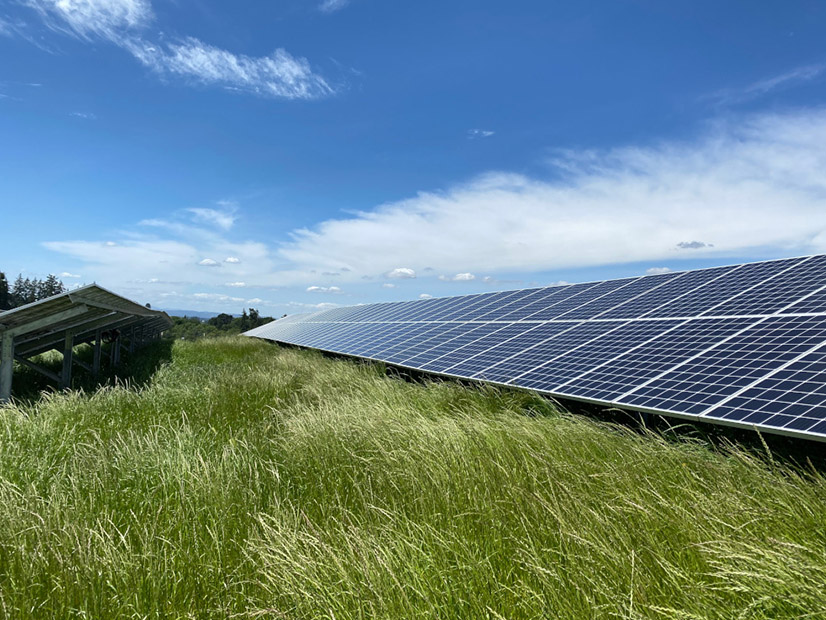The Oregon Department of Energy (ODOE) is embarking on an effort to distribute $50 million in public funding to support community-based renewable energy efforts — with a specific focus on projects that serve disadvantaged populations and provide grid resilience.
The money was earmarked in House Bill 2021, a sweeping law passed in June that requires the state’s investor-owned utilities to reduce their emissions by 80% by 2030 and serve retail customers with 100% clean energy by 2040, an ambitious timeline matched only by New York. (See West Coast Could be Net Zero by Midcentury.)
The bill stipulates that the funding be used to offset the costs of planning and developing community renewable projects no larger than 20 MW, with priority given to projects benefiting traditionally underserved communities, such as Oregon’s tribes, communities of color, lower-income communities, rural and coastal areas, and communities with limited infrastructure.
“We’re really pleased to be able to take part in a program like this and try to focus some funding into some parts of the state that maybe haven’t normally had it, for projects that are going to make a real difference … in some rural communities across Oregon. It’s an exciting opportunity for us,” Rob Del Mar, ODOE senior policy analyst, said Monday during a meeting of the state’s Energy Advisory Work Group, a stakeholder group that advises the department on budget, planning and policy decisions.
ODOE’s first step will be to “identify and qualify” targeted communities, Del Mar said. Eligibility to apply will be restricted to Oregon’s tribes, counties, municipalities with populations under 500,000 residents, government bodies such as ports and irrigation districts, and consumer-owned utilities (COUs).
“This program is going to be a little different from a lot of the other financial incentive programs that have been in Oregon in that it’s only available to public bodies or partnerships with public bodies,” Del Mar said.
The legislature also intended that about half the funding goes to grants awarded to “community energy resilience projects.”
“These are projects that may include renewable energy plus elements that increase energy resiliency within the community, such as battery storage [or] microgrids,” Del Mar said.
For resilience projects, the program will offer maximum grants up to $100,000 for planning and $1 million for construction, both of which can cover up to 100% of the costs for both phases. The same award amounts will be available to renewable energy-only projects, but the grants can cover no more than 50% of the construction costs for those projects.
“This is not to say that every grant will be providing this level of coverage of the total cost; these are just the statutory limitations,” Del Mar said. “And the grants will be awarded on a competitive basis. Projects that bring some [matching funds] will certainly enable us to spread the funds across more projects, so we’re hoping that we’ll see some of those.”
ODOE will also put performance agreements in place to ensure that projects meet program expectations, he added.
Reaching the Far Corners
The department has already begun work on recruiting an advisory committee to design program rules, establish equity metrics and develop a methodology for identifying qualifying communities. The group might also help to engage in community outreach to solicit projects and support the application review project.
“As the committee is built, we will continue to define roles and responsibilities,” Del Mar said.
According to the statute, committee members must be drawn from the state’s Environmental Justice Task Force; development agency Business Oregon; IOUs and COUs; a federally recognized Oregon tribe; and an organization that represents community renewable energy development. It will also include three members from local government to recognize the interests of cities, counties and special districts, as well as representatives from nongovernmental organizations that serve disadvantaged households and from state and federal emergency management agencies.
Del Mar said ODOE is aiming for a February 2022 deadline to complete program rules, develop related materials and hold community workshops. But many questions remain unanswered.
Key among them: What is the best way to reach potential applicants?
“We’re really looking to get into the far corners of the state and find projects in communities that maybe haven’t normally participated in state programs,” Del Mar said. “What are the needs for capacity building in these rural communities so that they can develop programs and put applications forward?”
The agency hopes to issue its first project opportunity announcements in March and being to take applications shortly thereafter.




